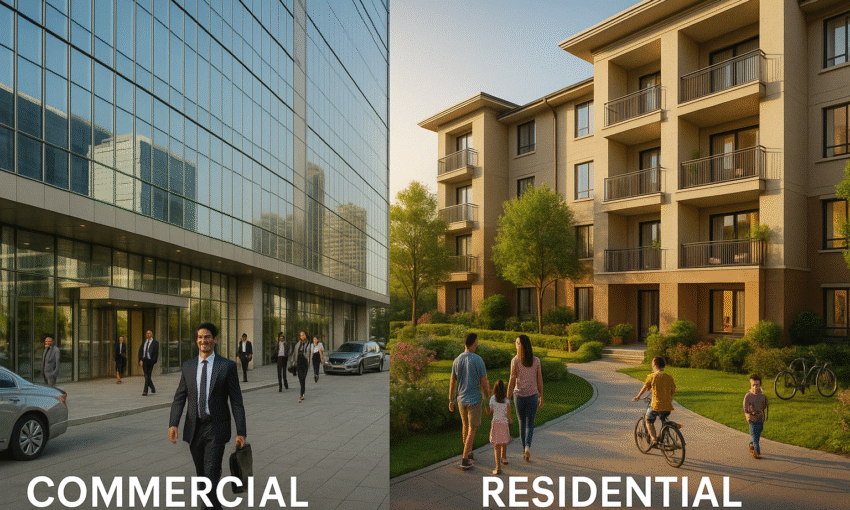Commercial vs Residential Investment: What’s Better?
For anyone embarking on the real estate investment journey, deciding between commercial and residential properties can be daunting. Both avenues come with their own opportunities and challenges, but which one aligns better with your investment goals?
This post dives deep into the world of property investment to explore the pros, cons, and key differences between commercial and residential real estate. By the end, you’ll have a clearer idea of which path suits your ambitions, whether you’re looking at investment opportunities in Bangalore or any other growing market.
Understanding Commercial Real Estate
When we talk about commercial real estate, we’re referring to properties that are used for business activities. Think office spaces, retail buildings, warehouses, and industrial properties.
Types of Commercial Properties:
- Office Buildings (e.g., coworking spaces, urban high-rises)
- Retail Spaces (e.g., shopping malls, standalone shops)
- Industrial Properties (e.g., warehouses, manufacturing plants)
- Mixed-Use Buildings (e.g., properties that serve both residential and commercial purposes)
Pros of Commercial Investments:
- Higher Income Potential
Commercial properties typically offer higher rental yields compared to residential properties. Businesses pay premium rent for good locations.
- Long-term Tenants
Commercial leases often span 3-10 years, providing investors with consistent cash flow.
- Professional Relationships
Unlike residential tenants, businesses tend to approach the landlord-tenant relationship more professionally.
- Triple Net Leases
Some types of commercial properties (e.g., retail spaces) use triple-net leases, where the tenant covers property expenses like maintenance, insurance, and taxes.
Cons of Commercial Investments:
- Higher Costs
Acquiring and managing commercial properties can demand a significantly higher financial commitment.
- Market Sensitivity
Commercial spaces are more affected by economic conditions, such as recessions or pandemics, which could impact vacancy rates.
- Complex Management
Managing commercial real estate can be time-consuming, often requiring property managers or specialized expertise.
Commercial real estate tends to favor investors with higher risk tolerance and deeper pockets. But what about residential investments?
Understanding Residential Real Estate
Residential real estate refers to properties intended for individual or family living. Examples include apartments, single-family homes, villas, and condos.
Types of Residential Properties:
- Single-Family Homes (e.g., independent houses)
- Apartments/Flats (e.g., multi-unit buildings)
- Vacation Homes (e.g., properties rented seasonally)
- Townhouses and Villas (e.g., upscale, private communities)
Pros of Residential Investments:
- Easier to Start
Residential property investments are typically more accessible for first-time investors due to their lower cost compared to commercial properties.
- Consistent Demand
People always need places to live, leading to generally stable occupancy rates.
- Financing Options
Banks often offer more favorable mortgage terms for residential real estate.
- Easier Resale
Residential properties can be sold relatively quickly, especially in high-demand areas like Bangalore.
Cons of Residential Investments:
- Lower Returns
While safer, rental yields in residential real estate tend to be lower compared to their commercial counterparts.
- High Turnover
Leases are typically shorter (6-12 months), leading to higher tenant turnover.
- Tenant Issues
Managing residential tenants can sometimes be challenging, involving maintenance requests and potential disputes.
Residential real estate is often an attractive option for beginners balancing risk with predictability.
Key Differences Between Commercial and Residential Investments
Feature | Commercial Real Estate | Residential Real Estate |
Rental Yields | Higher, but market-dependent | Moderate and stable |
Tenant Length | Long-term leases (3-10 years) | Short-term leases (6-12 months) |
Initial Investment | Higher cost | Lower cost |
Management | More complex | Simpler to manage |
Market Sensitivity | Highly sensitive | More resilient to downturns |

Risk vs. Reward
Commercial Real Estate Risks:
- Higher upfront costs and reliance on economic stability create greater financial exposure.
Reward: Higher income potential and less frequent tenant turnover.
Residential Real Estate Risks:
- Rental yields and prices grow more gradually.
Reward: Provides stable demand and easier entry for investors.
Choosing the right investment involves understanding your risk tolerance and financial goals.
Market Trends in Property Investment
- Commercial Trends: Post-pandemic recovery of office spaces is highly localized. For example, in Bangalore, there is rising demand for coworking spaces and tech hubs.
- Residential Trends: Urban housing markets, particularly in cities like Bangalore, continue to thrive with the growing population and demand for rental properties.
Staying updated with the latest market trends is key to making profitable decisions in real estate.
Expert Opinions
According to industry experts, choosing between commercial and residential investment ultimately depends on your financial position and goals. “If you’re looking for safer investments with steady returns, residential properties make sense,” says Rajiv Bhasin, a Bangalore-based property consultant. “For experienced investors, the potentially higher returns of commercial spaces can be worth the extra risk.”
Case Studies
Commercial Success Story
Vikram Mehta invested in a coworking space in Central Bangalore. With sky-rocketing industry demands, his annual rental yield increased by 15% within two years.
Residential Success Story
Priya Shah purchased a villa in South Bangalore in 2018. By 2023, it had appreciated by 30%, and she continued earning steady rental income the entire time.
Case studies highlight how tailored strategies can lead to success in different property types.
Which Investment is Right for You?
Ask yourself:
- Are you comfortable with high risk for higher rewards? → Consider commercial properties.
- Do you prefer stable, consistent income? → Opt for residential investments.
- How much capital do you have available? Residential typically has a lower entry cost.
For budding real estate investors, starting with residential can be easier, while experienced investors may benefit more from venturing into the commercial sector.
Take Your Next Step in Property Investment
Both commercial and residential properties offer unique opportunities. The right choice is determined by your financial goals, risk appetite, and market knowledge.
For more property investment tips, particularly in Bangalore, subscribe to our blog! Whether you’re a beginner or seasoned investor, our resources are designed to help you thrive in today’s real estate landscape.




